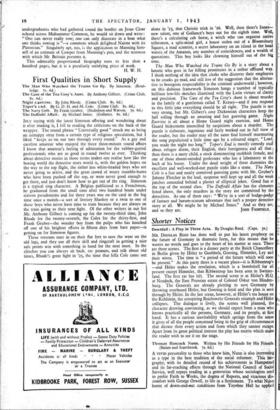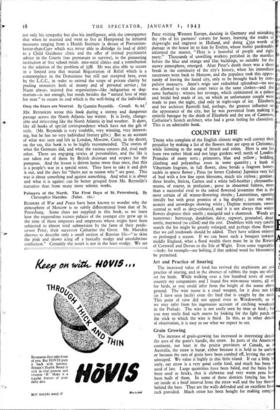Shorter Notices
Downfall : A Play in Three Acts. By Douglas Reed. (Cape. 5$.) MR. DOUGLAS REED has done well to put his latest prophecy on the future of Germany in dramatic form, for this means that he wastes no words and goes to the heart of his matter at once. There are three scenes. The first is a dinner party at the Reich Chancellery in Berlin given by Hitler to Goebbels, Goering, Himmler, Ley and their wives. The time is "a period of the future which will soon be present." At this party there is a vacant place—it is Ribbentrop's —and Hitler makes the revelation, which is a bombshell for all present except Himmler, that Ribbentrop has been seen in Switzerland. The first rat has left. The second scene is at Hitler's H.Q. at Neudeck, the East Prussian estate of Colonel Oskar von Hindenburg. The Generals are already plotting to save Germany by throwing overboard Hitler, but Goering is loyal and the plan is seen through by Hitler. In the last scene, however, at Hitler's tea house on the Kehlstein, the conspiring Reichswehr Generals triumph and Hitler collapses. The dialogue is lively, the scenes well planned, the character drawing convincing, as we should expect from a man who knows practically all the persons, Germany, and its people, at first hand. It has a curious inevitability which springs from the sense it gives of all the people concerned being in the grip of circumstances that dictate their every action and from which they cannot escape. Apart from its great political interest the play has merits which make the reader wish to see it on the stage.
Thomas Hancock Nunn. Written by His Friends for His Friends. (Baines and Scarsbrook. 78. 6d.) A VIVID personality to those who knew him, Nunn is also interesting as a type in the best tradition of the social reformer. This biography, with its detailed record of his achievement in Hampstead and its far-reaching effects through the National Council of Social Service, well repays reading in a generation whose sociologists tend to prefer Faith to Works, the dogma of Reports, and vicarious discomfort with George Orwell, to life in a Settlement. To what Mina learnt of down-and-eut conditions from Toynbee Hall he applied
not only his sympathy but also his intelligence, with the consequence that when he married and went to live in Hampstead he initiated measures ranging from a Health Institute (a dream of Preventionbetter-than-Cure which was never able to dislodge its load of debt) to a Child Guidance clinic and the offer of trained psychiatrist advice in the Courts (too premature to survive), to the pioneering institution of free school meals. ante-natal clinics and a contribution to the solution of the problem of 33B. He was also able to secure in a limited area that mutual Registration of Relief which is a commonplace in the Dominions but still not accepted here, even by the L.C.C., in order to extend the scope of private charity by pooling resources both of money and of personal service ; for Nunn always insisted that organisation—like indignation or dogmatism—is not enough, but needs besides the "natural love of man for man" to secure its end which is the well-being of the individual.
Onty the Stars are NeutraL By Quentin Reynolds. (Cassell. 8s. 6d.) MR. REYNOLDS wrote this book during a stormy and dangerous passage across the North Atlantic last winter. It is lively, changeable and interesting like the North Atlantic in bad weather. It dates, like all books of special correspondence which have not the gift of style. (Mr. Reynolds is very readable, very winning, very interesting, but he has no very individual literary gifts.) But as an account of what was seen and felt in London, Moscow, Cairo, in the desert, on the sea, this book is to be highly recommended. The stories of what the Germans did, and what the various censors did, rival each other. There are engaging stories of personalities, and the life is not taken out of them by British decorum and respect for the pompous. And the lesson is driven home more than once, that this is a people's war in a special sense. They have to take it and dish it out, and the days for "theirs not to reason why" are gone. This war is about something and against something. And what it is about and what it is agains: can be better grasped from Mr. Reynolds's narrative than from many more solemn works.
Palmyra of the North. The First Days of St. Petersburg. By Christoph:r Marsden. (Faber. i6s.) READERS of War and Peace have been known to wonder why the atmosphere of Moscow is so subtly differentiated from that of St. Petersburg. Some clues are supplied in this book, as we learn how the stupendous rococo palaces of the younger city grew up in the time of those emperors and empresses whose reigns have been subjected to almost total submersion by the fame of their predecessor Peter, their successor Catharine the Great. Mr. Marsden chooses to describe only a small section of Russian life—" to skim the pink and showy icing off a basically stodgy and unsalubrious confection." Certainly the result is not in the least stodgy. We see Peter visiting Western Europe, dancing in Germany and mistaking the ribs of his partners' corsets for bones, learning the trades of shipwright and engraver in Holland, and doing £350 worth of damage in the house let to him by Evelyn whose butler pardonably informed the master, "Here is a houseful of people and right nasty." Thousands of unwilling workers perished in the marshes before the blue and orange and lilac buildings so suitable for the snowy atmosphere, emerged. After Peter's death there was a short break in the continuity of the city's history, when his immediate successors went back to Moscow, and the populace took this opportunity of leaving the hated city, only to be brought back by compulsive measures. Anne's reign saw redoubled splendour—no one was allowed to visit the court twice in the same clothes—and the same barbarity: witness her revenge, which culminated in a palace and bridal bed made of ice, on which an unfortunate couple were made to pass the night, clad only in night-caps of ice. Elizabeth and her architect Rastrelli had, perhaps, the greatest influence on the appearance of the city, but he was prevented from making it entirely baroque by the death of Elizabeth and the use of Cameron, Catharine's Scotch architect, who had a great feeling for classicism. This is an admirable book.























 Previous page
Previous page